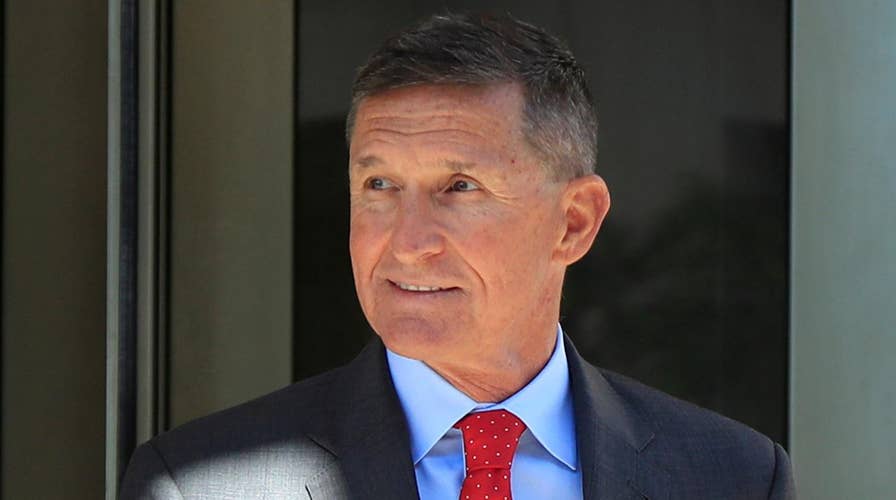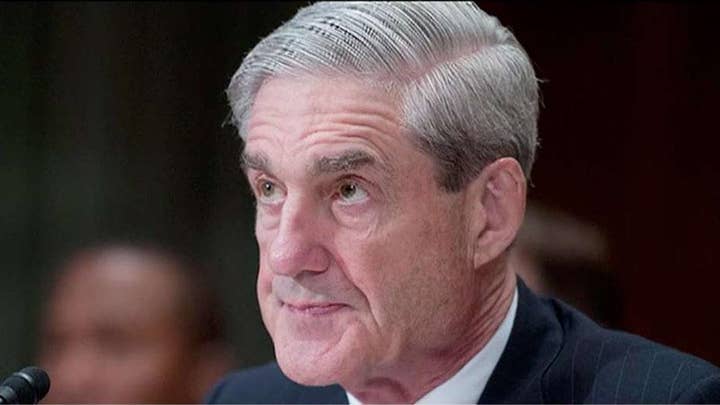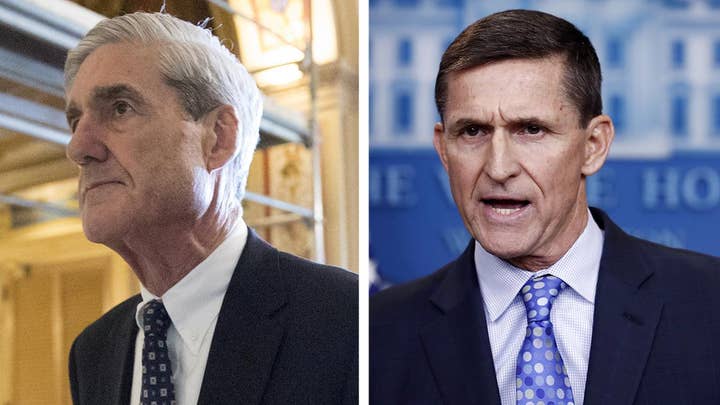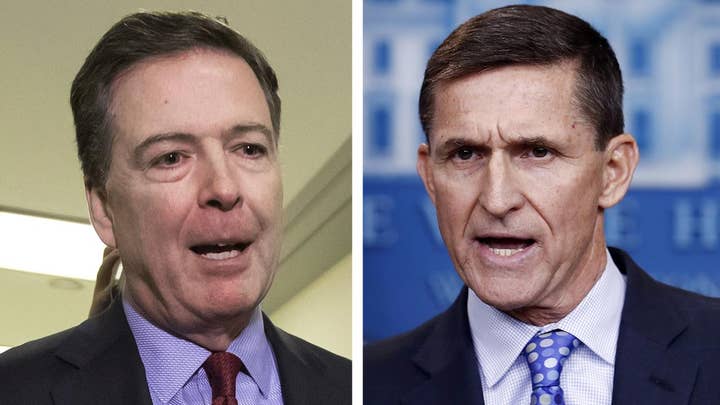Does Michael Flynn have a case for entrapment?
Former deputy assistant attorney general Harry Litman and Fox News contributor Jason Chaffetz debate.
Special Counsel Robert Mueller faces a Friday afternoon deadline to turn over documents related to former National Security Adviser Michael Flynn’s first interview with federal prosecutors, marking the latest twist in his turbulent prosecution dating back to his fateful Jan. 24, 2017 interview with agents at the White House.
Flynn’s legal team earlier this week made the bombshell allegation that the FBI had pushed him not to bring a lawyer to that interview. His attorneys further claim Flynn was not advised that any false statements he made could constitute a crime, as he was questioned about communications with the Russian ambassador.
Now, U.S. District Judge Emmet G. Sullivan, who is tasked with overseeing Flynn’s criminal case, is demanding details from Mueller and seeking 302s—or FBI documents memorializing interviews with witnesses. 302s are often critical pieces of evidence in false statements cases where, as in the Flynn case, the FBI does not have recordings. Sullivan is weighing Flynn's sentencing, following recommendations from Mueller’s office of little to no prison time for the former Army lieutenant general.
Here’s a look back at everything that’s happened in the case so far:
Jan. 24, 2017
Flynn, who at the time was national security adviser to President Trump, was approached by a pair of FBI agents for an interview at the White House. They wanted to discuss his communications with then-Russian ambassador Sergey Kislyak regarding sanctions in December 2016, which unbeknownst to Flynn had been picked up in wiretapped discussions. This interview would later form the basis for a false-statement charge and guilty plea.
Feb. 13, 2017
Flynn resigned from his White House post. The resignation came as he was accused of misleading Vice President Pence and other senior White House officials about those same communications with Kislyak. Pence, after being briefed by Flynn, had said in television interviews that Flynn did not discuss sanctions with the ambassador.
May 17, 2017
Special Counsel Robert Mueller was appointed by Deputy Attorney General Rod Rosenstein to take over the investigation of Russian meddling and possible collusion with Trump associates in the 2016 election.
Dec. 1, 2017
As part of the Mueller investigation, Flynn pleaded guilty to making false statements in his FBI interview regarding his talks with Kislyak. Flynn was charged with lying to federal investigators about whether he had talked to Kislyak about limiting the Russian government’s response to former President Barack Obama’s sanctions for election meddling.
His plea deal involved his full cooperation with investigators in the special counsel’s office.
According to the charging document, the false statements were that:
“On or about Dec. 29, 2016, FLYNN did not ask the Government of Russia’s Ambassador to the United States…to refrain from escalating the situation in response to sanctions that the United States had imposed against Russia that same day; and FLYNN did not recall the Russian Ambassador subsequently telling him that Russia had chosen to moderate its response to those sanctions as a result of his request.”
“On or about Dec. 22, 2016, FLYNN did not ask the Russian Ambassador to delay the vote on or defeat a pending United Nations Security Council resolution; and that the Russia Ambassador subsequently never described to FLYNN Russia’s response to his request.”
Flynn agreed to “cooperate fully, truthfully, completely and forthrightly” with the investigation, with sentencing delayed until those efforts “have been completed.”
Flynn was told he could be sentenced to federal prison for up to five years.
Flynn gave his guilty plea to Judge Rudolph Contreras of the U.S. District Court for the District of Columbia, but days later, Contreras recused himself from the case. Contreras is also a judge on the U.S. Foreign Intelligence Surveillance Court.
Feb.1, 2018
Two months after Flynn initially pleaded guilty, Mueller and Flynn’s attorneys filed a “joint status report” to Judge Emmet G. Sullivan requesting more time.
“Due to the status of the special counsel’s investigation, the parties do not believe that this matter is ready to be scheduled for a sentencing hearing at this time,” the filing from Mueller and Flynn attorneys Robert Kelner and Stephen Anthony read. “The parties shall file a joint status report by no later than May, 2018, stating whether the matter should be scheduled for sentencing or whether a deadline should be set for filing another joint status report.”
April-May 2018
A Republican-authored House Intelligence Committee report on the Russia probe was released. The eventually unredacted report said FBI agents did not believe that Flynn intentionally lied about talks with Russia’s ambassador.
“Director [James] Comey testified to the Committee that ‘the agents…discerned no physical indications of deception," the report said. "They saw nothing that indicated to them that he knew he was lying to them.’”
Comey, though, disputed the claims, saying “someone misunderstood something I said. I didn’t believe that and didn’t say that.”
May 1, 2018
The special counsel and Flynn’s attorneys filed another joint status report, requesting yet another 90-day delay for Flynn’s sentencing.
June 29, 2018
The special counsel and Flynn’s attorneys filed yet another joint status report.
Sullivan demanded information about why both sides had repeatedly asked for Flynn’s sentencing to be delayed.
Aug. 21, 2018
Another joint status report was filed by Mueller and Flynn’s attorneys, signaling that the former national security adviser was continuing to cooperate with the special counsel.
In July, Flynn’s attorneys said their client was “eager” to wrap up and proceed to sentencing.
September 2018
The special counsel and attorneys for Flynn said in a joint filing that the “matter is now ready to be scheduled for sentencing.”
Both sides asked the judge to set a date for sentencing.
Dec. 4, 2018
Mueller filed a memorandum recommending a lenient sentence, with the possibility of no prison time, for Flynn, stating that he has offered “substantial” help to investigators about “several ongoing investigations.”
“Given the defendant’s substantial assistance and other considerations set forth below, a sentence at the low end of the guideline range, including a sentence that does not impose a term of incarceration—is appropriate and warranted,” the memo said.
Flynn sat for 19 interviews with Mueller’s team and other Justice Department attorneys, according to the memo, and a heavily redacted supplemental filing attached. The documents did not provide specifics about what exactly Mueller had learned from Flynn, but indicated that he provided “documents and communications” about his time working with the Trump administration during the transition period.
Dec. 9, 2018
In a panel appearance with MSNBC’s Nicolle Wallace, former FBI Director Comey was asked how FBI agents ended up at the White House on Jan. 24, 2017 to interview Flynn. Comey's response provided new details about the circumstances that fueled criticism of the bureau's conduct:
“I sent them,” Comey said, adding that it was “something I probably wouldn’t have done or maybe gotten away with in a more … organized administration.”
The interview was arranged directly with Flynn, which was not typical protocol.
“If the FBI wanted to send agents into the White House itself to interview a senior official, you would work through the White House counsel, and there would be discussions and approvals of who would be there,” Comey said, describing how things normally would work.
Regarding his decision to bypass those steps, he said: “I thought: 'It’s early enough, let’s just send a couple guys over.'”
Dec. 12, 2018
Flynn’s attorneys said in a court filing that former FBI Deputy Director Andrew McCabe nudged Flynn not to have an attorney present during the questioning that led to his guilty plea.
The document revealed that the FBI took a significantly more aggressive tack in handling the Flynn interview than it did during other similar matters, including the agency’s sit-downs with Hillary Clinton and ex-Trump adviser George Papadopoulos, who was also charged with making false statements to federal investigators.
Flynn’s attorneys alleged that the FBI agents in his case did not instruct Flynn that any false statements he made could constitute a crime, and decided not to “confront” him directly about anything he said that contradicted their knowledge of his wiretapped communications with Kislyak.
If “Flynn said he did not remember something they knew he said, they would use the exact words Flynn used . . . to try to refresh his recollection," FBI agents wrote in the so-called "302" witness interview report cited by the filing. "If Flynn still would not confirm what he said . . . they would not confront him or talk him through it.”
Dec. 14, 2018
Mueller faces an afternoon deadline to produce the sensitive FBI documents related to Flynn’s interviews.
Sullivan’s brief order stated that Mueller can choose to file the materials under seal if necessary.
Sullivan also ordered the Flynn team to turn over the documents backing up their assertions.
Flynn is set to be sentenced next Tuesday – but Sullivan’s review could potentially delay that date.
Sullivan has the authority to toss Flynn’s guilty plea and the charge against him if he concludes that the FBI interfered with Flynn’s constitutional right to counsel, although he has given no indications that he intends to do so.
Fox News’ Gregg Re, Judson Berger, Alex Pappas and The Associated Press contributed to this report.
















































